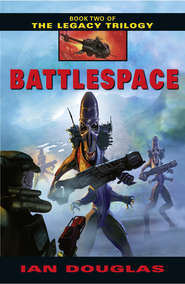По всем вопросам обращайтесь на: info@litportal.ru
(©) 2003-2025.
✖
Dark Mind
Настройки чтения
Размер шрифта
Высота строк
Поля
“We also want to establish contact, if possible, with the Rosette entity.”
Koenig smiled. His advisors had told him that when the Pan-Europeans made their request, he should put them off, that he should say that he would have to consult with his staff.
“Of course, Herr Generalleutnant,” he said instead. “We would be most happy to take part in your expedition.”
Kurz looked at him sharply. “I’m surprised, Mr. President. Gratified, but surprised! Don’t you need time to discuss this with your people?”
“Not really. I was already aware of much of what you’ve just told me. I’m sure you knew this already.”
“Well … yes …”
“And you will also know that I don’t like games, political or otherwise.”
“I can appreciate that, Mr. President.”
Koenig glanced around, then pulled up a finder map on his in-head feed. He was in this throng somewhere … ah! There.
Gene? Koenig called, sending a mind-to-mind call. Get your ass over here.
On my way, Mr. President.
Admiral Gene Armitage separated himself from a small mob on the other side of the huge room and made his way toward Koenig and the Pan-European general. Head of Koenig’s Joint Chiefs of Staff, Armitage was his principle military advisor and the man who would get the ball rolling in the planning of any new military operation.
“Herr Generalleutnant Kurz … head of the Joint Chiefs of Staff, Admiral Armitage.”
“We’ve met. Admiral? Good to see you again.”
“At Geneva last month,” Armitage said, nodding. “A pleasure, sir.”
“We’re going to be sending a contingent with the Confederation to Kapteyn’s Star, Gene,” Koenig said. “Discuss the details with the general, please, and then make it happen.”
“Aye, aye, sir.” Armitage’s expression remained shuttered, giving nothing away. Which was commendable, seeing as he’d been the one who’d recommended that Koenig not give the Pan-Europeans an immediate answer.
The biggest problem, Koenig thought, turning away and leaving the two to talk in private, was the fact that few in the USNA military trusted the Confederation yet. The Brits were okay; their defection during the war had accelerated the enemy’s disintegration as a coherent fighting force. The Russians, the North Indians … the USNA could work with them well enough. But the Pan-European destruction of the city of Columbus the previous year had left the USNA with a bitter taste in its mouth, and the fact that the attack apparently had been carried out by renegade elements within the Genevan government hadn’t made the bitterness easier to swallow. There were still many within the former United States who wanted to charge the Pan-Europeans, in particular, with crimes against Humankind.
That, Koenig reflected, isn’t going to happen. Behind-the-scenes deals cut by his administration before the public negotiations had guaranteed the Confederation immunity from war-crimes charges if they would agree to the peace talks. That strategy had been strongly urged by Konstantin, the powerful AI located on the far side of Earth’s moon. The USNA was clearly winning the short, sharp war against the Confederation, but they needed peace. They were in very nearly as bad a shape as the Pan-Europeans—worse, possibly, after major strikes against American soil—and with the looming advance of the Rosette Aliens, Humankind needed to come together in a united front now, at any cost.
Koenig didn’t always understand Konstantin’s logic, but this time it seemed straightforward enough. It still wasn’t clear that the Rosette Aliens were overtly hostile, but they had destroyed human ships and bases, and Humanity had to come before any petty geopolitical squabbles.
Especially since, in the background, the alien Sh’daar, time-travelers from the remote past determined to block Humankind from its approaching technological singularity, always lurked in ambiguous mystery. They’d agreed to a cease-fire with Earth … but for how long? Their long-term motives were still far from clear.
Shadowed by his four bodyguards, Koenig made his way to one of several bars set up on the slowly turning floor. They moved with a fluidity that betrayed an essential fact: presidential security was now handled by robots—in this case a quartet of human-looking androgynoids far faster, stronger, and smarter than anything modeled in flesh and blood. They could pass as human—very nearly—though the deliberate blurring of sexual characteristics gave them a touch of the uncanny valley effect. Like the old United States Secret Service, you could tell what they were by the fact that they constantly watched everyone in the room except for the person they were protecting.
Koenig ordered a jovian from the robotic bartender. One of the security bots closely scanned both the botender and the mirror-polished globe it passed to Koenig.
“Thank you,” he told the robot behind the bar. He glanced at the security machine and cocked an eyebrow. “Don’t worry. He’s one of yours.”
“Of course, Mr. President.” But it completed the scan anyway. Security was a lot tighter—and far more automated—since the Confederation strike at Columbus.
He wasn’t actually complaining.
“Mr. President,” a woman said behind him. “I haven’t had a chance to welcome you to D.C.”
Koenig turned to face Shay Ashton—Governor Shay Ashton, rather. Once a crack USNA fighter pilot, she’d retired to her home in the D.C. swamps, and ended up leading the defense of the ruins when the Confederation tried to claim some of the supposedly abandoned USNA Peripheries for themselves. She’d gone on to become interim governor for D.C. as it was formally reintegrated into the country, and was titular head of the territory now. There were rumors that she was going to be drafted as one of the D.C. representatives to Congress in next year’s general elections, though she’d not formally announced her candidacy.
He smiled. “Madam Governor! It’s good to see you again.”
Two of the security ’bots were giving her a very close scan, checking for weapons, explosives imbedded inside her body, anything at all that might be a threat. It was hard to see how she could be hiding much; she was wearing a holographic sheath of rippling light in greens and blues, with the image of the Freedom’s Star ribbon glowing above her left breast. An animated tattoo of a bright green butterfly opened and closed its wings on her right cheek.
She smiled sweetly at one of the machines. “See anything you like?”
“That will do,” Koenig told the machines. “I’ve known Ms. Ashton for a long time, and if she’s a threat, it’s definitely to the other guys.”
“Of course, Mr. President,” one said … but, as with the ’botender, they completed their scans.
“Machines,” she said. “I still can’t get used to them.”
“I know what you mean.” Actually, Koenig thought, he didn’t know what she meant … he couldn’t. Shay had been born and raised outside of the USNA’s comfortable high-tech envelope, where the locals had to farm and fish just to survive. She’d been exposed to advanced technologies, certainly—from robots to genetic prostheses to AIs to nano-grown cerebral implants during her tour in the Navy—but you really needed to have grown up with that sort of technology to get the most out of it. Even now, millions of people all over the country were Prims—Primitives—people brought up in the Peripheries, who didn’t have access to high tech, or who’d come to it later in life.
The expression on her face told him she’d caught him out, and he shrugged. “Sorry.”
“That’s okay, Mr. President.” Her right forefinger touched her forehead, her left the center of her sternum. “You’re almost there … thirty centimeters.”
He chuckled and nodded. Thirty centimeters—the distance between brain and heart. Knowing a fact was different from feeling it.
Koenig lightly squeezed the silver jovian in his hand, and the upper surface slid open, releasing a small, thick puff of greenish vapor. He inhaled, savoring the tingling rush channeling directly to his brain.
He smiled at Ashton. “Can I get you one of these? They’re good …”
“Thank you, no, sir. Prims have trouble with brainstimming, sometimes. I can’t handle the stuff.”
The green vapor consisted of clouds of nanotechnic units programmed to send waves of pleasurable sensations directly into the brain via the olfactory bulb. The sense of smell was the only one hardwired directly into the brain rather than through a long chain of nerves, and brainstimming gave a socially acceptable euphoric buzz without impairment or hangover. People who’d received their cerebral implants later in life, however, rather than as small children, could have trouble handling the storm of sensations, could become disoriented and might even pass out. Such, apparently, was the case with Ashton.
“Of course.”
“So we’re really going to go through with this, Mr. President? The new alliance, I mean?”
“It seems to be the best course for us. For Earth, I mean.”
“That’s assuming we can trust them.” She nodded toward General Kurz, now deep in conversation with Armitage.
“Well … yes.”
“Some of them wanted to sell out to the Sh’daar.”
“I know, Ms. Ashton. And to a certain extent I agree with you. But Konstantin says that we won’t survive another encounter with the Sh’daar if we don’t work with the Confederation … to say nothing of the Rosette Aliens. We unite, or we die. There is no middle ground.”
“Konstantin.” She made a face. “Another machine.”











